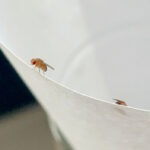Traveling by air is a marvel of modern convenience, whisking us across continents in hours. However, the unique environment of an airplane cabin can present unexpected challenges to our bodies, particularly concerning hydration. The question, “Can Flying Dehydrate You?” is not just a casual inquiry but a vital consideration for health-conscious travelers, especially athletes.
The air inside an airplane cabin is meticulously controlled, but this control comes at a cost to humidity levels. Unlike the air on the ground, cabin air is often kept at very low humidity, typically below 20% and sometimes as low as 10%. This dryness is due to the way air is circulated in airplanes. Air is drawn from outside the aircraft at high altitude where it’s extremely cold and contains very little moisture. While this air is heated and pressurized for passenger comfort, the heating process further reduces the relative humidity. Breathing in this dry air leads to increased water loss through respiration. Additionally, the skin, our largest organ, also loses moisture more rapidly in dry environments.
Beyond the dry air, several other factors contribute to potential dehydration during air travel. Pre-flight and in-flight routines can play a significant role. Travelers may reduce fluid intake before a flight to minimize bathroom trips, especially on long-haul journeys. Limited access to beverages or infrequent drink service during flights can further restrict fluid consumption. Even when drinks are available, passengers might opt for coffee or alcoholic beverages, which can have diuretic effects, potentially exacerbating dehydration.
The impact of air travel on athletes is of particular interest due to the potential performance decrements associated with dehydration and jet lag. Studies have investigated the effects of transmeridian travel on various aspects of athletic performance, including jump performance, sprint speed, and strength. While research directly linking dehydration during flights to performance decline is still emerging, it’s well-established that dehydration, even mild hypohydration, can impair physical and cognitive functions.
Image: A table summarizing studies on jet lag and transmeridian travel effects on athletes, highlighting performance outcomes and hydration status assessment.
Research summarized in studies like those by Chapman et al. and Bullock et al., focusing on skeleton athletes traveling from Australia to Canada, indicate performance decrements after long flights. These studies, while not directly measuring dehydration, observed reductions in lower body power and sprint performance post-flight. Interestingly, many studies on athletes and air travel, as presented in Table 2 of the original research, do not consistently report on fluid intake or hydration status. This gap in research highlights a critical need to understand the combined impact of flight-induced dehydration and jet lag on athletic performance.
Furthermore, studies examining physiological responses to air travel reveal impacts on cardiorespiratory fitness and hormonal balance. Geertsema et al. found a decrease in oxygen saturation during flights, suggesting physiological stress. Lemmer et al.’s research showed disturbances in heart rate, blood pressure, and hormone levels (cortisol and melatonin) in athletes after transmeridian travel. Again, these studies often lack data on the hydration status of participants, making it difficult to isolate the role of dehydration in these physiological changes.
The subjective experiences reported by athletes, including fatigue, muscle soreness, and reduced mental preparedness after long flights, further underscore the potential impact of air travel stressors. While these subjective scales haven’t been directly correlated with hydration levels in flight studies, it’s plausible that dehydration contributes to these negative perceptions.
Addressing the question “can flying dehydrate you?” definitively requires more focused research. However, current evidence strongly suggests that the dry cabin environment, coupled with pre and in-flight behaviors, creates a dehydrating environment. For athletes and all travelers, proactive hydration strategies are essential to mitigate the potential negative effects of air travel. Drinking plenty of water before, during, and after flights, avoiding excessive caffeine and alcohol, and choosing water-rich foods can help maintain optimal hydration levels and overall well-being during and after air travel. Future research should prioritize investigating the combined effects of dehydration and jet lag to develop targeted strategies for minimizing performance disruptions and health risks associated with flying.
